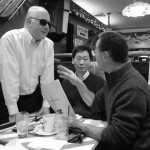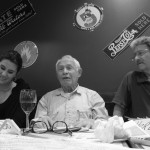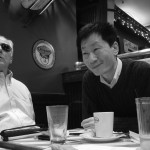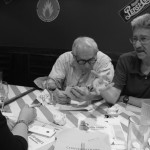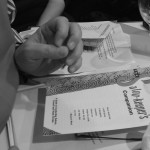I’m just coming to the end of my 2 month stay in New York City. It’s been a great place to explore the theory behind my startup business, Climbing Fish. I’m even more convinced that it’s quality connections and conversations that help people to do great things (and for some reason we have stopped doing both). We’re now planning a spring launch of the service in the Big Apple.
As I pack my bag, I’ve added to the weight by a few books collected. Prized is Seth Godin’s book (personally signed) “The Icarus Deception” – still not fully read! Others have been read – and others consumed via my friend’s excellent startup audio book service, Bardowl. This morning I had a long conversation with my Climbing Fish co-founder about the value of reading self-books. We are both cynical about how much benefit they give – especially compared to conversations – but we both, like flies to the light, get drawn in! Also, we discussed whether we give academic, well researched, structured writing too much time – and whether it freezes us into inaction. Discuss?
On my last night in Manhattan, I had a very swanky invitation to the Upper West Side to the home of Nobel Laureate Joseph Stiglitz. Not my usual circle. My friend – Mrs Moneypenny (the Financial Times columnist) – was speaking to a group called “Sunday at Six”. The soiree is run by another Brit – Phyllis Roome – and is an invite only event dedicated to getting people together in real conversations (very Climbing Fish!).
 Mrs M gave a great performance – in between drinks and a very nice supper. She was launching the paperback version of her book “Career Advice for Ambitious Women” (which is just out in the US). She’s not just a columnist – but makes her living as a headhunter … mixed with stand up performances in Edinburgh Fringe and off-Broadway. Very entertaining – and as you can see from the picture Joseph was very relaxed with her conversation.
Mrs M gave a great performance – in between drinks and a very nice supper. She was launching the paperback version of her book “Career Advice for Ambitious Women” (which is just out in the US). She’s not just a columnist – but makes her living as a headhunter … mixed with stand up performances in Edinburgh Fringe and off-Broadway. Very entertaining – and as you can see from the picture Joseph was very relaxed with her conversation.
I’d done my usual Google research on Joe. His resume is incredible. He is a Nobel laureate in economics, a professor at Columbia and a former chairman of the Council of Economic Advisers and chief economist for the World Bank, is the author of “The Price of Inequality.”. In the last week, he’d written an excellent piece for the New York Times – “Inequality Is Holding Back the Recovery” – that gave an overview of how he felt the US would only get economic recovery through dealing with inequality. In the article, he advised President Obama to focus on clearing up inequality – especially the shocking child poverty in the country.
 I looked at some of the UN stats in this area – and the US record on child poverty is horrific. Joe’s article had over 700 comments. His argument was very strong. He was right, but what could I do?
I looked at some of the UN stats in this area – and the US record on child poverty is horrific. Joe’s article had over 700 comments. His argument was very strong. He was right, but what could I do?
As I left the party I had the chance to shake hands and chat briefly to Joe. I asked the question that had been fixed in my mind since reading the article. “When I walk out of here today – what can I – as an individual – do to reduce inequality?”. Joe looked a little stumped, then thoughtful and answered: “Two things – work at it through politics and as an employer make sure you pay people properly (including taxes).”
I was a bit disappointed – he might have seen it in my face. No time to discuss further. What had I expected? Maybe a “tie a yellow ribbon” moment – something that millions of people could do as individuals today (without reading more books, articles, political lobbying – or waiting for someone else).
It convinced me that we’re on the right track with individual action to solve solutions – by maybe less reading and more conversation…. leading to REAL action.
By the way – anyone out there with some suggestions on what each of us can do today to solve inequality? I am fairly certain that none of my readers are Nobel Laureates … but I bet you that between us “simple souls” we could could up with something? Suggestions please…
 Last week, John (my Climbing Fish co-founder) forwarded me an article in
Last week, John (my Climbing Fish co-founder) forwarded me an article in  Even more spooky – when we exchanged business cards… SNAP. We both had Einstein Quotes on the back of our cards! Surreal…
Even more spooky – when we exchanged business cards… SNAP. We both had Einstein Quotes on the back of our cards! Surreal…


 My favourite story of the night (but sadly not the winner) was by
My favourite story of the night (but sadly not the winner) was by  As I now have a reputation for having pictures taken with famous authors (
As I now have a reputation for having pictures taken with famous authors (
 While I’ve been in New York I’ve been researching what part conversations play in greasing the wheels of my start up business,
While I’ve been in New York I’ve been researching what part conversations play in greasing the wheels of my start up business, I went along to the Conversations New York session at Penn Station (in a table at the back of TGI Fridays). It was a diverse group (as would be expected from the melting pot of New York) – all committed to getting the art of conversation going in New York. They have a lovely statement that outlines their aims:-
I went along to the Conversations New York session at Penn Station (in a table at the back of TGI Fridays). It was a diverse group (as would be expected from the melting pot of New York) – all committed to getting the art of conversation going in New York. They have a lovely statement that outlines their aims:-
